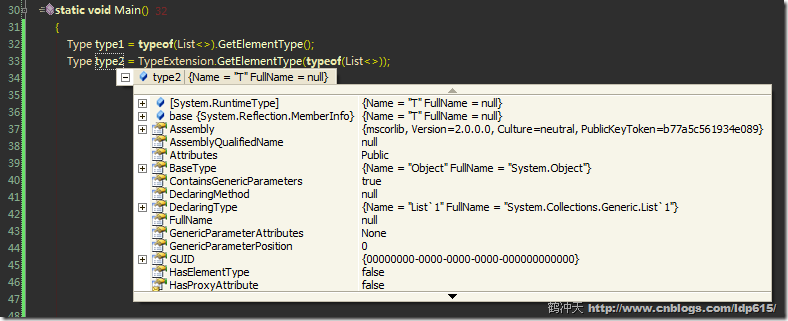c# 扩展方法奇思妙用高级篇八:Type类扩展
2009-12-11 19:43 鹤冲天 阅读(7129) 评论(14) 编辑 收藏 举报Type 类提供了大量的属性和方法,但在一些基础性开发工作中,Type类功能还有些欠缺,尤其上在处理泛型类型时,如可空类型和泛型集合类型。下面的类就针对这些地方进行扩展。
扩展源码
2 {
3 public static bool IsNullableType(this Type type)
4 {
5 return (((type != null) && type.IsGenericType) &&
6 (type.GetGenericTypeDefinition() == typeof(Nullable<>)));
7 }
8
9 public static Type GetNonNullableType(this Type type)
10 {
11 if (IsNullableType(type))
12 {
13 return type.GetGenericArguments()[0];
14 }
15 return type;
16 }
17
18 public static bool IsEnumerableType(this Type enumerableType)
19 {
20 return (FindGenericType(typeof(IEnumerable<>), enumerableType) != null);
21 }
22
23 public static Type GetElementType(this Type enumerableType)
24 {
25 Type type = FindGenericType(typeof(IEnumerable<>), enumerableType);
26 if (type != null)
27 {
28 return type.GetGenericArguments()[0];
29 }
30 return enumerableType;
31 }
32
33 public static bool IsKindOfGeneric(this Type type, Type definition)
34 {
35 return (FindGenericType(definition, type) != null);
36 }
37
38 public static Type FindGenericType(this Type definition, Type type)
39 {
40 while ((type != null) && (type != typeof(object)))
41 {
42 if (type.IsGenericType && (type.GetGenericTypeDefinition() == definition))
43 {
44 return type;
45 }
46 if (definition.IsInterface)
47 {
48 foreach (Type type2 in type.GetInterfaces())
49 {
50 Type type3 = FindGenericType(definition, type2);
51 if (type3 != null)
52 {
53 return type3;
54 }
55 }
56 }
57 type = type.BaseType;
58 }
59 return null;
60 }
61 }
从名字上就以大体知道方法的功能,下面是部分测试代码,帮助大家理解:
测试代码
2 public void IsNullableTypeTest()
3 {
4 Assert.AreEqual(true, TypeExtension.IsNullableType(typeof(int?)));
5 Assert.AreEqual(false, TypeExtension.IsNullableType(typeof(int)));
6 Assert.AreEqual(true, TypeExtension.IsNullableType(typeof(Nullable<DateTime>)));
7 Assert.AreEqual(false, TypeExtension.IsNullableType(typeof(DateTime)));
8 }
9 [TestMethod()]
10 public void GetNonNullableTypeTest()
11 {
12 Assert.AreEqual(typeof(int), TypeExtension.GetNonNullableType(typeof(int?)));
13 Assert.AreEqual(typeof(DateTime), TypeExtension.GetNonNullableType(typeof(Nullable<DateTime>)));
14 }
15 [TestMethod()]
16 public void IsEnumerableTypeTest()
17 {
18 Assert.AreEqual(true, TypeExtension.IsEnumerableType(typeof(IEnumerable<string>)));
19 Assert.AreEqual(true, TypeExtension.IsEnumerableType(typeof(Collection<int>)));
20 }
21 [TestMethod()]
22 public void GetElementTypeTest()
23 {
24 Assert.AreEqual(typeof(int), TypeExtension.GetElementType(typeof(IEnumerable<int>)));
25 Assert.AreEqual(typeof(DateTime), TypeExtension.GetElementType(typeof(Collection<DateTime>)));
26 }
27 [TestMethod()]
28 public void IsKindOfGenericTest()
29 {
30 Assert.AreEqual(true, TypeExtension.IsKindOfGeneric(typeof(List<string>), typeof(IEnumerable<>)));
31 Assert.AreEqual(true, TypeExtension.IsKindOfGeneric(typeof(string), typeof(IComparable<>)));
32 }
33 [TestMethod()]
34 public void FindGenericTypeTest()
35 {
36 Assert.AreEqual(typeof(IEnumerable<string>),
37 TypeExtension.FindGenericType(typeof(IEnumerable<>), typeof(List<string>)));
38 }
代码就是最好的文档,想必大家已经都看明白了。
TypeHelper 是我从一个类库中提取的,它原本是一个 internal static class,内部的方法同样 internal static 。我仅仅是把 internal 改成了 public ,并在每个方法的第一个参数前加了个 this,最后给类中的方法按从简到难的顺序进行了排序。
也许是因为 TypeHelper 是一个内部类,并有强烈的应用语境,TypeHelper 并没有采用契约式编程的方式,甚至在命名上也做了一些省略: 如 IsEnumerableType、GetElementType 两个方法是实际是用来处理泛型集合类型的,但在方法名和参数名上并没有“Generic”的字眼。(如果传入非泛型类型或其它类型,将会产生难以预料的结果或异常。)
像这样简单将内部静态类 TypeHelper 中的静态方法公开为扩展方法是存在问题的,所以在应用之前,还得再做些工作。改进成为契约式编程的方式并不难,难的是给扩展方法起一个清晰明了简单易懂的名字,否则就不要扩展了。IsEnumerableType、GetElementType 应该体现出是对泛型集合进行操作,简单加上Generic字样后名字好长,也不好理解。(大家如果能想出好的名字,请发在回复中,不胜感激!)
补充
另外在使用时,我发现两处“奇怪”的地方,如下图:
调试至此处,type1为空,type2则是一个少见的奇怪类型。
TypeHelper 的出处我会在下一篇随笔中进行说明。
本人系列文章《c#扩展方法奇思妙用》,敬请关注!![]()
-------------------
思想火花,照亮世界



【推荐】国内首个AI IDE,深度理解中文开发场景,立即下载体验Trae
【推荐】编程新体验,更懂你的AI,立即体验豆包MarsCode编程助手
【推荐】抖音旗下AI助手豆包,你的智能百科全书,全免费不限次数
【推荐】轻量又高性能的 SSH 工具 IShell:AI 加持,快人一步